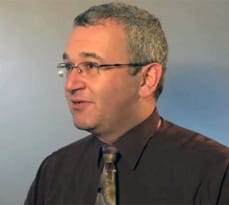Research into the communication of information around all-important CCS, Carbon Capture and Storage, has revealed serious flaws which could hinder deployment of the technologies.
[vimeo id=41853919]
Dr David Reiner, of Cambridge Judge Business School, headed a pan-European research team looking into how information about CCS is communicated and asked what key lessons might be learned that will affect the technology’s deployment.
He says a major finding was that the communication of information is directed at technical elites. A member of the public, even well-educated, but untrained in geology and sciences, would not understand a typical geologist’s diagram.
“At a global level carbon dioxide capture and storage is helping deal with climate change but when you are a home owner and you are worried about what does this mean for me, even if you care about the environment, you may think well why am I the one bearing the risk? Why am I the one who has to worry about CO2 seeping out of the ground?”
Dr Reiner says typical diagrams of carbon capture and storage projects, often using tree heights to illustrate the depths of underground CO2 storage sites, give the wrong impression.
“One thing to do is to get the communication right. If you are trying to explain this to local people, try not to leave them with the impression that the CO2 is not 50 metres deep but that it really is a kilometre deep. Try to give them some sense of understanding of basic geological processes or that the geological formation is not going to allow the CO2 to escape very easily.”
He feels more should be made of what he calls the value proposition or benefits of CCS projects to communities. His experience with the energy industry worldwide has taken him to sites where there are ‘difficult pieces of infrastructure’ that are far more hazardous than CO2. Success has been achieved through providing benefits to local communities who acknowledge the risks but also recognise the benefits.
The sources of information are generally the advocates of the CCS technology like governments who are supporting, even subsidising, the projects as well as the developers, largely the energy industry. Research shows that the vast majority of the public who turn instead to environmental NGOs and pressure groups trusts neither. However, when asked, greater trust is placed in independent or university-based scientists.
Dr Reiner and his team want to see a change in the way information is communicated moving away from the highly technical, top-down system which applies even to the Internet.
“It’s a one-way broadcast. There is no way of addressing what are often quite legitimate and serious concerns that a member of the public might have. You’re explaining the technical details of the issues but not explaining other issues to do with social concerns, political concerns and economic considerations.
“The communication is almost purely at a technical level and if it is just the developers communicating, they are often doing so with information that is far too complex and detailed. It’s not surprising that the public is left with a bad taste in the mouth.”
Dr David Reiner is Director of the MPhil in Technology Policy Programme at Cambridge Judge Business School, Assistant Director of the Electricity Policy Research Group and a University Senior Lecturer in Technology Policy.


